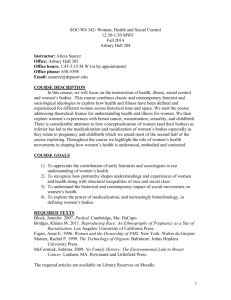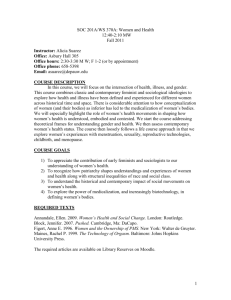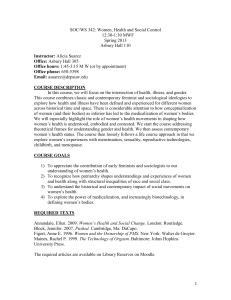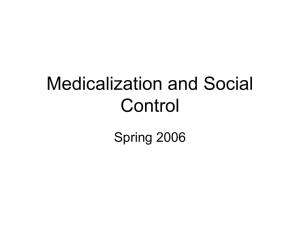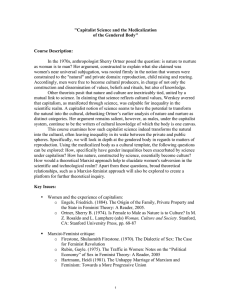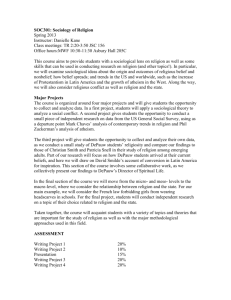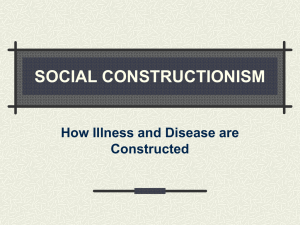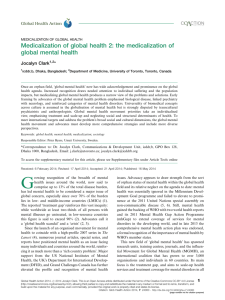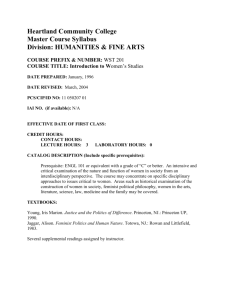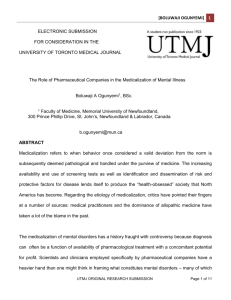University of California Press. Figert, Anne E. 1996. Women and the
advertisement
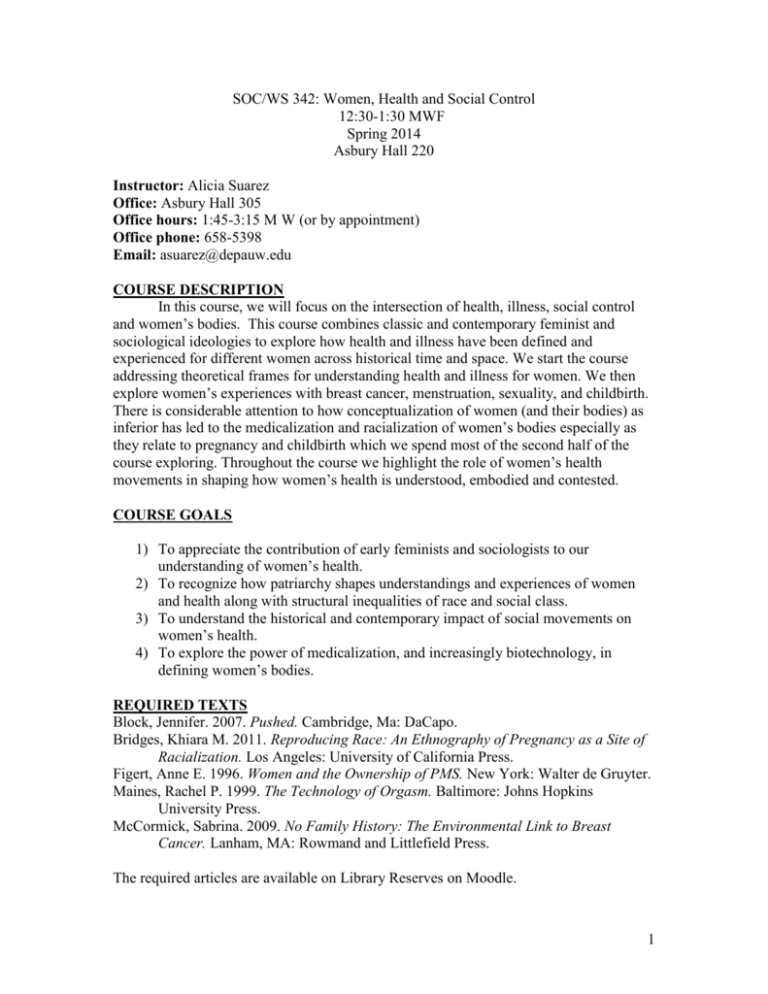
SOC/WS 342: Women, Health and Social Control 12:30-1:30 MWF Spring 2014 Asbury Hall 220 Instructor: Alicia Suarez Office: Asbury Hall 305 Office hours: 1:45-3:15 M W (or by appointment) Office phone: 658-5398 Email: asuarez@depauw.edu COURSE DESCRIPTION In this course, we will focus on the intersection of health, illness, social control and women’s bodies. This course combines classic and contemporary feminist and sociological ideologies to explore how health and illness have been defined and experienced for different women across historical time and space. We start the course addressing theoretical frames for understanding health and illness for women. We then explore women’s experiences with breast cancer, menstruation, sexuality, and childbirth. There is considerable attention to how conceptualization of women (and their bodies) as inferior has led to the medicalization and racialization of women’s bodies especially as they relate to pregnancy and childbirth which we spend most of the second half of the course exploring. Throughout the course we highlight the role of women’s health movements in shaping how women’s health is understood, embodied and contested. COURSE GOALS 1) To appreciate the contribution of early feminists and sociologists to our understanding of women’s health. 2) To recognize how patriarchy shapes understandings and experiences of women and health along with structural inequalities of race and social class. 3) To understand the historical and contemporary impact of social movements on women’s health. 4) To explore the power of medicalization, and increasingly biotechnology, in defining women’s bodies. REQUIRED TEXTS Block, Jennifer. 2007. Pushed. Cambridge, Ma: DaCapo. Bridges, Khiara M. 2011. Reproducing Race: An Ethnography of Pregnancy as a Site of Racialization. Los Angeles: University of California Press. Figert, Anne E. 1996. Women and the Ownership of PMS. New York: Walter de Gruyter. Maines, Rachel P. 1999. The Technology of Orgasm. Baltimore: Johns Hopkins University Press. McCormick, Sabrina. 2009. No Family History: The Environmental Link to Breast Cancer. Lanham, MA: Rowmand and Littlefield Press. The required articles are available on Library Reserves on Moodle. 1 EVALUATION There will be 3 short answer/essay exams in the course that covers course readings, videos, and issues raised in class. You will be given 5 dates and will turn in, at the beginning of class, a reaction papers on assigned readings for 4 of those 5 dates. See handout for more information. You will also do 1 out of 4 possible interview research projects/papers. See handout for more information. Late papers will get points deducted. Participation is also a required aspect of this course. Grading: My points Exam 1 Exam 2 Exam 3 Participation Reaction Papers Social Justice/Change/Activism Total 60 points 60 points 60 points 50 points 60 points 60 points 350 points I will follow the usual DePauw University grading system whereby: A or A- reflects, “achievement of exceptionally high merit.” B+, B, B- reflects, “achievement at a level superior to the basic level.” C+, C, C- reflects, “basic achievement.” D+, D, D- reflects, “achievement which falls short of satisfying the quantitative and qualitative requirements yet warrants credit.” Remember, you do not start the course with an A and lose points. You essentially start with zero points and earn your grades along the way. Please meet with me if at any time you have questions about your grades. Do not wait until the end of the semester. OTHER POLICIES Attendance and Participation: I expect you to attend class prepared on time and ready to engage with the material and the class community. Simply showing up to class having skimmed the readings is insufficient. If everyone does this, we will have a boring class (and you will have to listen to me the whole time). If only a few people are prepared, we will only know their opinions and miss out on the full classroom experience of everyone participating. Another reason for you to come to class is that you will be tested on material that is presented only in class lecture/ discussion. If you want to be familiar with this material, you must be in class. Thus, if you want to do well in this class, you will very quickly learn that daily attendance and participation is essential. I also expect you to engage in our Moodle discussion forum where class discussions can continue and we can post items of interest to discuss. 2 In addition, we must be watchful to not take up too much “airtime” and allow for everyone to share. Talking a lot is generally not a good way of actively participating. Instead, carefully listening to others and clearly and concisely expressing your input is the best strategy. Remember to address each other when talking rather than directing your comments to me (unless they are solely intended for me!) Of course, no texting or looking at social media, etc. is allowed during class. If you consistently are looking at websites, checking email, etc. I will ask you to not bring your laptop to class. Classroom Etiquette: In order to have a positive and safe learning environment, we as a class will have to agree to disagree at times. Some of us may have strong feelings and/or reactions to class materials, readings, etc. Expressing these reactions is encouraged as long as this is done in a respectful manner. Hostile and/or disrespectful behavior is not allowed. In addition, we must be watchful to not take up too much “airtime” and allow for everyone to share. Talking a lot is generally not a good way of actively participating. Instead, carefully listening to others and clearly and concisely expressing your input is the best strategy. Remember to address each other when talking rather than directing your comments to me (unless they are solely intended for me!) Communication: Please come and visit me during office hours. I am there waiting for you to discuss readings, lecture, grading, exams, classroom behaviors, sociology, etc. If you cannot come to scheduled office hours, please let me know and we will work something else out. The best way to reach me is through e-mail. I will communicate with the class through email. I expect each of you to check your email on a daily basis. Late work/Make-up Work: All papers are due at the beginning of class and all exams will be taken in class on the schedule day, unless, I receive in advance, an official notification that you will be off-campus on official university business or some other legitimate and verifiable excused absence. There will be NO EXTRA CREDIT assignments available to anyone. Academic Dishonesty/Misconduct: I take academic dishonesty or misconduct extremely seriously as surely you do as well. Please be familiar with the DePauw University Academic Integrity Policy available in the Student Handbook. Any student violating this policy will be subject to a range of disciplinary actions. Students with Disabilities: DePauw University offers accommodations to students with disabilities. It is your responsibility to contact the Americans with Disabilities Act (ADA) coordinator: Pamela Roberts, to request accommodations. 3 SCHEDULE Readings must be completed prior to class on the due date. We may get off schedule and I will make adjustments accordingly in the event that this occurs. 1/27 (M) Introduction to Class Theorizing about Women and Health 1/29 (W) 1/31 (F) 2/3 (M) Annandale, Ellen. “Recovering Gender and Health in History” Gilman, Charlotte Perkins. “The Yellow Wallpaper.” (DePauw Web Access EBook) Wells, Susan. 2008. “Our Bodies, Ourselves: Reading the Written Body.” Signs 33:697-723. Conrad, Peter. 2005. “The Shifting Engines of Medicalization.” Journal of Health and Social Behavior 46:3-14. Bell, Susan E. and Anne E. Figert. 2012. “Medicalization and Pharmaceuticalization at the Intersections: Looking backward, sideways and forward.” Social Science and Medicine 75: 775-783. Women, Breast Cancer, and the Environment 2/5 (W) 2/7 (F) 2/10 (M) 2/12 (W) 2/14 (F) 2/17 (M) 2/19(W) Gorman, Bridget K. and Jen'nan Ghazal Read. 2006. “Gender Disparities in Adult Health: An Examination of Three Measures of Morbidity.” Journal of Health and Social Behavior 47:95-110. McCormick Intro-Ch 2. McCormick Ch 3-4 McCormick 5-7 Film: Pink Ribbons, Inc Film: Pink Ribbons, Inc Exam 1 The Medicalization of Menstruation 2/21 (F) 2/24 (M) 2/26 (W) 2/28 (F) 3/3 (M) 3/5 (W) 3/7 (F) Fingerson, Laura. 2005. “Agency and the Body in Adolescent Menstrual Talk.” Childhood 12:91-110. Figert Ch. Intro-1 Figert Ch. 2-3 McCabe, Janice. 2005. “Who Are the Experts? Medicalization in Teen Magazine Advice Columns.” Sociological Studies of Children and Youth 11:153-191. Figert Ch. 4-5 Figert Ch. 6-7 Figert Ch. 8-9 Film: Red Moon 4 Medicalization of Female Sexuality: Orgasm 3/10 (M) Maines ch. 1-2 Hysteria 7:30pm Ashley Square Cinema 3/12 (W) 3/21 (F) Cacchioni, Thea. 2007. “Heterosexuality and 'the Labour of Love': A Contribution to Recent Debates on Female Sexual Dysfunction.” Sexualities 10:299-320. Maines ch. 3 Class visit: Christine Suarez, MFA, Feminist choreographer http://www.suarezdance.org/ Hartley, Heather and Leonore Tiefer. 2003. “Taking a Biological Turn: The Push for a "Female Viagra" and the Medicalization of Women's Sexual Problems.” Women’s Studies Quarterly 31:42-54. Maines Ch. 4 Braun, Virginia. 2005. “In Search of (Better) Sexual Pleasure: Female Genital 'Cosmetic' Surgery.” Sexualities 8: 407-424. Maines Ch. 5 Exam 2 3/24-3/28 Spring break 3/31 (M) Film: Orgasm, Inc. 3/14 (F) 3/17 (M) 3/19 (W) Medicalization and Racialization of Childbirth 4/2 (W) 4/4 (F) 4/7 (M) 4/9 (W) 4/11 (F) 4/14 (M) 4/16 (W) 4/18 (F) 4/21 (M) 4/23 (W) 4/25 (F) Block Introduction-Chapter 2 Block Ch. 3 Miller, Amy Chasteen. 2009. “Midwife to Myself: Birth Narratives Among Women Choosing Unassisted Homebirth.” Sociological Inquiry 79:51-74. Beckett, Katherine. 2005. “Choosing Cesarean: Feminism and the Politics of Childbirth in the United States.” Feminist Theory 6: 251-275. Block Ch. 4 Block Ch. 5-6 Speaker: Professor Castaneda Film: Freedom for Birth Block Ch 7 Speaker: Certified Professional Midwife Cheyney, Melissa. 2011. “Reinscribing the Birthing Body: Homebirth as Ritual Performance.” Medical Anthropology Quarterly 25: 519-542. Speaker: Home Birth Mothers Layne, Linda L. 2003. “Unhappy Endings: A Feminist Reappraisal of the Women's Health Movement from the Vantage of Pregnancy Loss.” Social Science and Medicine 56: 1881-1891. Bridges Intro-Ch 1 Bridges Ch 2 Bridges Ch 3 Esposito, Noreen. 1999. “Marginalized Women’s Comparison of their Hospital and Freestanding Birth Center Experiences. ” Health Care for Women International 20: 5 4/28 (M) 4/30 (W) 5/2 (F) 5/5 (M) 5/7 (W) 5/14 (W) 111-126. Bridges 4 Brubaker, Sarah Jane. 2007. “Denied, Embracing and Resisting Medicalization.” Gender and Society 21: 528-552. Bridges Ch 5 Vainik, Jenni. 2008. “Reproductive and Parental Rights of Incarcerated Mothers.” Family Court Review Bridges Ch 6 Social Justice/Social Change/Activism: reflection Social Justice/Social Change/Activism: reflection Exam 3 9:30-11:30am 6
